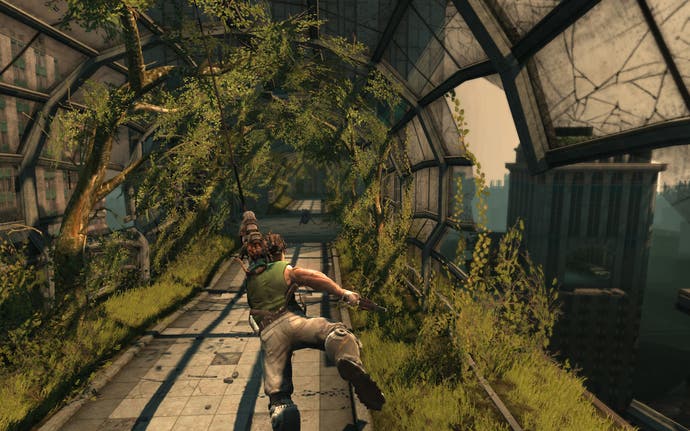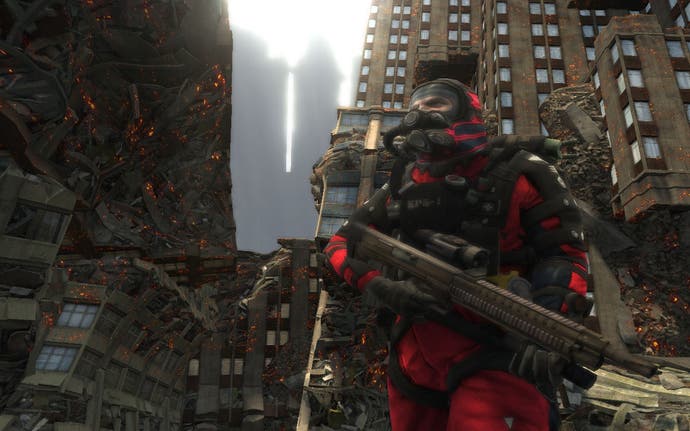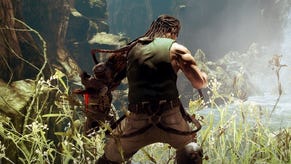Bionic Commando
King of the swingers.
Bionic Commando creeps up on you. It has sprawling cities - decapitated by terrorism and disaster, teetering and grinding their way into dust and disarray as you pass across their rumpled asphalt and negotiate accumulated debris - that grumble and mourn their fate quietly in sunlight cooled by their desertion, weeping in bilious dust-waves that crash against the camera.
It has infinite shades of grey - narratively and aesthetically. It pits you against terrorists forced regretfully into action by the death sentence set against them by a government trying to recover their bionic enhancements - arms, legs, kidneys, hearts - to cover up the long-term side effects of augmentation. It asks you to hunt them down and end them, and implicitly expects you to sympathise with them, but its developers promise that it's not a message game, although it is something that you will be able to walk away from with a personal outlook on the events that you've shaped.
It has a great core concept: that your own enhancement, a bionic arm, enables you to attach to the environment and swing across great distances, using gravitational forces to establish momentum - by leaping from a walkway, attaching your grapple line to its nearside edge and swinging beneath it - and then twisting the right-analogue camera to find new attach points to build that momentum intuitively. It augments this with an auto-aim element that pushes the targeting reticule towards viable grapple points on the vertical axis, but leaves it to you to steer yourself in viable directions, establishing an agreeable balance between freedom and restraint.

It has levels designed to harness this - you - without compromising its fiction or overburdening your suspense of disbelief; the twisted disaster-ridden cityscape with contorted girders, the broken limbs of elevated freeways; the inviting boughs of densely composed foliage; the arcing pipes, platforms and walkways of shut-down industry, overlooking a flood that sweeps the ankles of factories in rollicking waves.
It threatens you in a gently escalating curve, allowing you to survive early mistakes bearing the scars of nothing more than ignominy, as you hit the ground and have to recapture past heights; latterly sinking you into perilous and unnatural urban rivers and lakes that drown you if you can't extricate yourself with an urgent grapple to a nearby structure.
It has combat that feeds on the promise of that bionic enhancement, allowing you to approach situations guns ablaze, tag enemies with multiple homing rockets from a distance, or grapple them directly and zip to them in one swift motion that smashes them backwards with enough force to shatter their defences and frequently kill them outright. It gives you the ability to whip cover away from enemies that hide behind it, and weaponise it with a versatile three-button combination attack that propels it back at them.

It has enough physics code to articulate these elements, and enough of a sense of humour to let you apply this to the limp bodies of vanquished foes. It has a multidirectional spin attack and an evade function to get you out of tricky situations. It has a radar to plot the location of enemies, and objectives, and a health system that uses a reddening effect to inform you of your plight, rather than asking you to cast your eyes across the screen furniture.
It has tougher foes, who only buckle to lateral thought, charging you and resisting frontal assaults until you explore their weak points - and having built these encounters into miniature boss-fights, expands your arsenal and challenges your competency again later when you're capable to defeat them in larger groups. It changes pace, asking you to puzzle your way indoors by unplugging holes in buildings covered by debris that you can latch onto and remove. It wants to let you explore, and backtrack, and promises to open up once you've gotten into the swing of things.









